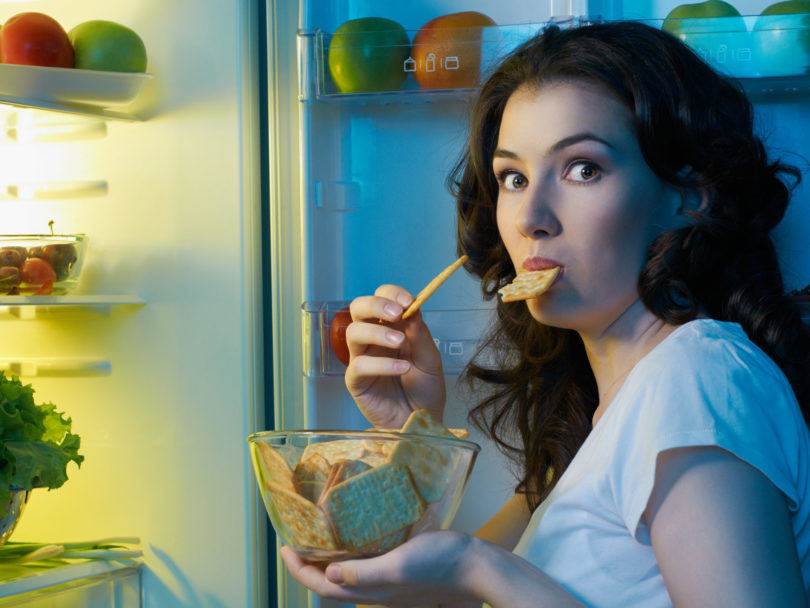In the hours before bedtime, the kitchen often seems to gain inexplicable power.
The late-night munchies have chipped away at many a diet plan, leading to overeating, slowed digestion, painful heartburn and disrupted sleep. But what if that growling stomach simply won’t go away? Don’t ignore it, nutrition experts say — just be smart.
“I never recommend going to bed hungry,” says Kristen Nagy, a registered dietitian with Bon Secours Health System in Hampton Roads, Va. “Try to have finished eating two hours prior to bedtime, but if you are really hungry just before bed, snack suggestions are similar to what they would be throughout the day.”
Nagy’s top picks combine protein, which is filling, and a healthy carbohydrate, such as Greek yogurt with fruit, an apple with peanut butter, whole-grain crackers with cheese, or carrots with hummus.
“Best” lists from other local physicians and dietitians are heavy on fruits, vegetables and whole grains, including:
- String or cottage cheese with a serving of whole-grain crackers
- Turkey slices on a piece of whole-wheat bread
- Avocado on crispbread (Wasa and Ryvita are two popular brands)
- A handful of almonds and grapes
- A small “pizza” made with tomato and a sprinkle of shredded cheese on a wheat English muffin
- Two or three cups of air-popped popcorn, which is rich in fiber, perhaps with a few favorite nuts mixed in
Eating at night doesn’t necessarily translate to weight gain, as what matters is total calories over a 24-hour period, says Caroline West Passerrello, a Pittsburgh, Penn.-based registered dietitian and spokesperson for the Academy of Nutrition and Dietetics. While the body does burn more energy earlier in the day, portion control is most important, Passerrello stresses.
“My advice is to figure out what you crave and eat a small amount of that — slowly and mindfully,” she advises. “Otherwise, you can eat your way around the kitchen trying to avoid what you actually want. There are really no bad foods, just bad portions.” For example: Enjoying a pre-measured snack baggie of favorite chips is fine, but inhaling a big bag in front of the TV isn’t.
High-fat foods do take longer to digest, leaving acidic stomach juices around longer to potentially cause reflux. So staples of fast-food runs, such as pizza, Chinese, burgers, fries and milkshakes, can be trouble. Spicy, sugary or caffeinated items — think hot Indian or Mexican dishes, cookies, candy or chocolate — also can wreck sleep, affecting the normal production of appetite-regulating hormones for the next day.
Sometimes, no food is the right choice, Passerrello says: “When you feel hungry, you actually might be thirsty instead.” Plain water is always safe (albeit not so much as to trigger frequent overnight bathroom runs); for a fizzy drink without caffeine or a lot of sugar, mix three parts club soda or seltzer water and one part juice. For those craving a warm drink, herbal teas are good options.
“Even decaf coffee has a little caffeine in it, and it only takes a little to disturb your sleep,” says Kevin Wolf, a family medicine physician with Riverside Primary Care-Hidenwood in Newport News,Va. “A calming tea with something like chamomile or mint can be incorporated effectively as part of a wind-down routine and not affect your caloric bottom line.” Soda and alcoholic beverages, on the other hand, often add excess calories and contribute to insomnia.
Beyond thirst, late-night hunger can be the symptom of another problem, such as stress, boredom, exhaustion or a lack of filling foods during the day. “People beat themselves up for being ‘weak’ at night, but they can’t fix it because they’re not addressing the underlying issue,” Passerrello says.
Focusing on sleep habits, relaxation techniques, free- time activities and especially daytime diet can help. “Back loading” too many calories can overwhelm the metabolism and boost fat storage, Nagy says. “Try to spread your calories more evenly throughout the day,” she recommends. “Start eating within one to two hours of waking up, to get your metabolism going. Try not to go longer than five to six hours without eating something. A good balanced meal should hold you at least three to four hours.”
As bedtime approaches, look for alternatives to snacking, she adds: “If you’re feeling stressed, try something relaxing, like taking a warm shower. If you’re bored, try getting some things crossed off your to-do list or pick up an enjoyable hobby.”
Finally, if nothing else works, simply disarm the kitchen by freeing it from temptations. In other words, keep the cookies and potato chips off the shopping list. “Plan for your food-eating habits when you go grocery shopping so you only have healthy choices, any time of day,” Wolf says. “The timing isn’t nearly as important as the quality.”

